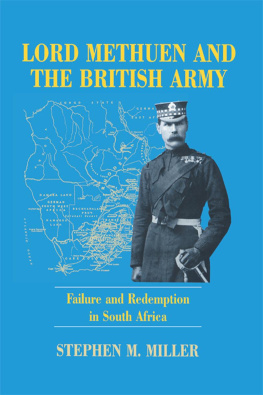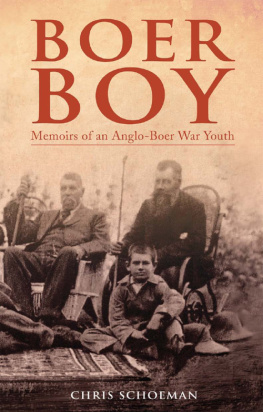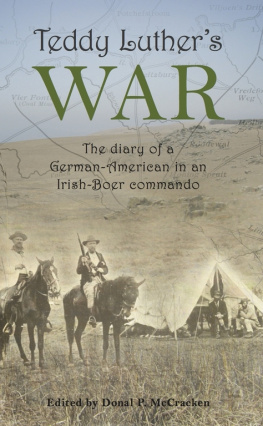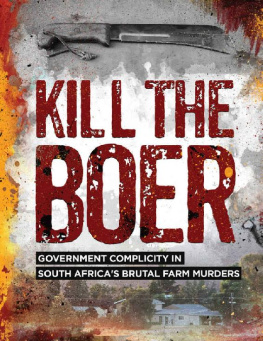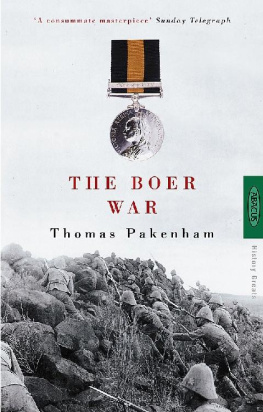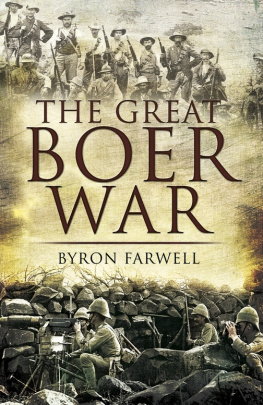PREFATORY NOTE
The author has endeavoured in this Handbook to compile, for the use of students and others, a general account of the various phases of the Boer War of 1899-1902, in which he served for twenty-six months.
With some exceptions, every statement of fact relating to the military operations may be verified in one or more of the following publications
The "Times" History of the War;
The War Office Official History of the War;
The Minutes of Evidence taken before the Royal Commission of Inquiry into the War.
To the two Histories, which have been but recently completed, the Author is much indebted. Other authorities have, however, been consulted.
The Sketch Maps and Plans of certain areas and battlefields are only intended to give, by means of a few hachures, contours, and form-lines, a general impression of topographical features.
The Author has from time to time in the course of the narrative indicated what he believes to have been the chief causes of the prolongation of the War:
The inefficacy of modern Tactics as a means of dealing with partisan warfare;
The moral reinforcement derived from a confident belief in the justice of a cause, by which the enemy was continually encouraged to persevere;
The reluctance of the British leaders to fight costly battles;
The constitutional inability of the British Officer to take War seriously;
The waste of British horses due to inexpert Horsemastership.
May, 1910.
CHAPTER I
Prolegomena
I. THE ROUNDHEADS OF SOUTH AFRICA
History often reproduces without reference to nationality some particular human type or class which becomes active and predominant for a time, and fades away when its task is finished. It is, however, not utterly lost, for the germ of it lies dormant yet ready to re-appear when the exigencies of the moment recall it. The reserve forces of human nature are inexhaustible and inextinguishable.
It is probable that few of the Boers had ever heard of Oliver Cromwell, or that his life and times had ever been studied in the South African Republics, and had influenced the Boer action; yet the affinity of the South African burghers of the XIXth century with the Puritans and the Roundheads of the XVIIth is striking. It was not so much a parallelism of aims and hopes, for the struggle in England was political and not national as in South Africa, as of temperament, character, and method. There was hardly an individuity in the Boers of the War which might not have been found in the followers of Cromwell. Like these they were fanatically but sincerely religious, and their unabashed and fearless adherence to their beliefs and their open observance of the outward forms of religion exposed them to the same cruel and baseless charge of hypocrisy. Just as the aristocratic followers of Charles I had jeered at the Roundheads, so did every thoughtless officer and newspaper correspondent jeer at the psalm-singing and the prayer meetings in the laagers. The Boers had the courage of their religious opinions, and were not ashamed to proclaim them in the face of man. The Bible was the only book they knew, and they guided themselves according to their lights by its precepts. In opposing the English they believed that they were resisting the enemies of the Almighty. Like the Puritans they honestly thought that certain passages in the Holy Scriptures applied to them as the Chosen People, and that they were assured of Divine Protection; and if they erred in their exegesis their delusion at least deserves respect. Yet all the while the Old Testament was the volume they chiefly studied, and if they quoted the New Testament they sometimes modified the context to their own advantage.
Each Puritan movement has derived its strength not so much from its abstract merit as from the intense personal conviction felt by each unit engaged in it, that the righteousness of the cause was unassailable. The Puritan never wavered in philosophic doubt. No misgivings disturbed his soul, and he pursued his object with all the strength of his body.
The Puritan stir in the reign of Charles I was a revival, almost a continuation, of the half political, half religious activity which in the previous century had effected the Reformation. The Boer movement in South Africa, which sprang up after a germination lasting three generations, was brought about by a recrudescence of the spirit which made the Boers of the Netherlands rise against Alva and the Spanish domination in the XVIth century.
In the XVIIth century the Boers of the Netherlands, made a voluntary settlement in South Africa, and there under the Southern Cross they were joined by French Puritans, who had fought under Cond and who left their country after the revocation of the Edict of Nantes, and also by some persecuted sectaries from Piedmont. The two stocks, although one was of Teutonic and the other of Celtic origin, easily came together, and under the pressure of common interests and common dangers were consolidated and vulcanized: and if in the previous generation the English Pilgrim Fathers of the Mayflower had directed their course to the south instead of to the west, and had cast anchor off the shore of that distant region of Good Hope, it is probable that a mighty nation would have been founded in South Africa.
Cromwell as the military leader of the Commonwealth Boers is, at least in England where the military art has not been scientifically studied, one of the suppressed characters of history. His political achievements, as is perhaps natural in a community which courts the voter and despises the soldier, have put out of sight the means by which he mainly won them; namely his genius as a cavalry and partisan commander. An ungainly, narrow-minded, bigoted, bucolic squireen of Huntingdon, lacking in every quality which we are accustomed to associate with a cavalry officer, inaugurated an era in the history of Mounted Troops. His methods are studied on the Continent, and the German Staff has recently discovered that he was the first leader to use cavalry as a screen to hide the movements of the main body. Yet there is no evidence that he ever studied the military art, and he did not become a soldier until he had reached his fourth decade. In the Royalist Army opposed to him were soldiers by profession and experience; officers and men who had been under Gustavus Adolphus in the Thirty Years' War; for in the XVIIth century the services of aliens were in request on the Continent, and at one time no less than eighty-seven senior officers of British nationality were serving in the Swedish Army, then the most renowned in Europe. Yet Cromwell with his "Eastern Association," his Ironsides, his yeomen and raw levies, beat the Royalist Army, officered from the same class which is still believed to possess the monopoly of the aptitude for leading men in war, by exercising the homely qualities of energy, self-control, endurance, and practical common sense applied instantly to the occasion of the moment.


